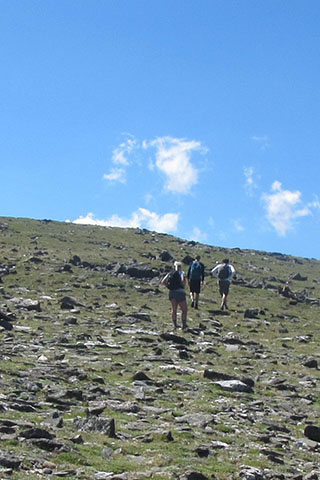| 737 | Self Rescue Avoid Huffing and Puffing |
2012-11-30 |

In order to enjoy a hike, we must first, be fit enough so that moving is not a struggle. In the Nashville Parks, we often encounter hikers carrying heavy loads on the day hike trails. We routinely ask what they are training for and the replies are usually for an epic kind of hike, such as the Appalachian Trail, Mount Rainier, or Grand Canyon (for just a few of the response.) These hikers see the need to train before their trips.
Other hikers do not train. Maybe because of busy schedules or other reasons, they do not train before leaving town. Instead they plan on going slow and suffering through the first days of their trip. As they train on the trail they gradually grow fit - like it or not!
Still others do not train simply because they do not know better. They are inexperienced and think that hiking is about the same as walking down a sidewalk just with better scenery.
Once on the trail, all three different types of hikers may experience the huffing and puffing syndrome - or the I-cannot-get-enough-air-into-my-lungs-to-keep-from-panting-like-a-dog disorder. Huffing and puffing is not necessarily a sign of our conditioning, it is more a combination of weather, terrain, conditioning, and experience.
Hiking in severe heat is hard on our bodies. As the temperatures increase we need more air to help regulate our body temperature. Soon we are huffing and puffing. In the heat, we need to move as efficiently as possible. Slow down and move at whatever speed is comfortable.
As the trail grows steeper, regardless of weather, the harder we breath. If we continue at the same rate that we were walking on the flats, soon our bodies will be gasping. A super fit person will probably not go huffing and puffing as fast as a couch potato, but we all have our thresholds.
Training equals conditioning. As we train we condition our bodies to adapt to the rigors of life on the trail. Our conditioning dictates the speed we can walk without throwing our bodies into a huffing and puffing frenzy.
Experience is our regulator. It looks at the weather, terrain, and conditioning and regulates a safe speed to walk. We allow our bodies to acclimate to the conditions and then naturally find a speed to meet our needs.
So for a few tips to avoid huffing and puffing ...
To judge huffing and puffing, carry on a conversation while hiking. If we are alone and don't feel like talking to ourself, whistle. When our breathing is labored, slow down.
Lighten our loads. By carrying less (including body weight) we move easier.
Drink plenty of water to help hydrate and control our internal temperature.
On hills, by shortening our stride, we can often times maintain our pace without over-stressing your breathing.
Huffing and puffing is our bodies telling us that if we don't back off, things are going to start shutting down.
Don't be afraid to slow down.
Altitudes effect us all, until we are acclimated. Once again, slow down and listen to your body.
In planning, the expected temperatures and terrain will effect our speed.
We gain experience by putting in the miles.
Avoid hiking in the heat of the day.
With group hiking, it is hard to adapt a good pace for everyone. The leader should always be shuffling the order to get the slowest hikers to the front of the group.
Overexertion leads to stress. We then make bad decisions that could put our safety at risk.
Excessive huffing and puffing is our body complaining. Don't keep pressing, instead back off a bit and govern your speed in respect to the weather, terrain, conditions, and experience.
Happy avoid huffing and puffing on the trails
Down is Optional ... Up is Mandatory - introduction
Self Rescue on Trails - the program
Self Rescue - Plan Ahead - plan to prevent
Self Rescue - Be Kind to Yourself - don't make it hard, make it easy
Self Rescue - Be a Lightweight - walk light and easy
Self Rescue - Avoid Huffing and Puffing - listen to your body and control your speed
Self Rescue - Take a Break - give your body a chance to recover
Self Rescue - No Food, No Fuel, No Fun - feed the motor
Self Rescue - Watch Your Time - always know your location, time, and speed